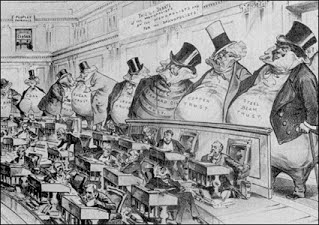By: Anthony Pahnke, vice president of Family Farm Defenders and assistant professor of international relations at San Francisco State University.
Originally published by TheHill on March 4th, 2021
From destroying perfectly good food due to supply chain bottlenecks, to farmworkers risking their lives in the fields for poverty-level wages, the COVID-19 pandemic has brought to the fore our food system’s rigid, wasteful and exploitative nature.
Given President Biden’s recent order to review supply chains, with those in agriculture included, now is the time to consider using our country’s antitrust laws to help make our food system more resilient, equitable and competitive.
More to the point, enforcing these laws, namely, the progressive-era Sherman, Clayton,and Federal Trade Commission (FTC) Acts, authorize government officials to break up corporations that monopolize markets to restrain trade and suppress dynamic competition, as well as conduct wide-sweeping investigations of the potential negative effects of mergers.
A survey of the field — yes, pun intended — shows increasing corporate control that does nothing to counter rampant waste and exploitation.
According to the Open Markets Institute, the four largest poultry processing firms went from controlling 35 percent of the market in 1986 to 51 percent in 2015. For beef, the story is much the same as the market share of the four largest processors jumped from 25 percent in 1977 to 85 percent in 2015. The top four seed companies’ market share, also during this period, went from 59 to 85 percent.
Undergirding this expansion of corporate consolidation is unnecessary suffering.
Just speak to the workers in meatpacking plants around the country who have labored under constant fear of contracting the virus as outbreaks spread from firm to firm.
In professions already characterized by dangerous work conditions and low pay, food system workers now find themselves pressuring owners for basics such as face masks, hazard pay and information on the nature of the virus.
Meanwhile, these same corporate processors regularly gauge farmers at the marketplace, as revealed in the periodic settlement for price fixing in the dairy, pork, and poultry industries.
Farmers could pay higher wages and provide better work conditions to workers but they also suffer because of chronically low prices for their produce. According to the National Farmers Union, about 14 cents of every food retail dollar goes to the farmer, with the remainder going to restaurants, retailers and processors.
Consolidated supply chains that squeeze farmers for so much gave producers no choice but to dump their milk, plow under vegetables, euthanize their animals and smash eggs. This, as the lines at the food banks around the country grew.
When faced with such egregious waste, the government threw money at the problem. And it was a lot — upwards of 40 percent of farm income in 2020 came from government subsidies.
To add insult to injury, 10 percent of farmers received 60 percent of the payments as a small number of relatively well-resourced producers took an unfair share of the aid.
The point — our rigid, corporate-controlled food system dishes out equal servings of waste as it does exploitation.
The way forward is to reform the system — with antitrust.
First, we need action concerning mergers. The Department of Justice (DOJ) should consider worker welfare as part of its merger guidelines when considering whether or not a combination should be approved.
Next, investigations are required into the profit margins and pricing strategies of agribusiness firms. Instead of receiving news of corporate malfeasance from the periodic settlement, farmers and workers deserve to know the extent of anti-competitive practices that exist throughout the system.
The Federal Trade Commission (FTC) investigation of the meatpacking industry from 1917 to 1919 is exemplary of such an effort, which ultimately led to regulatory reform and corporate divestiture in railroads and stockyards after disclosing decades of illegal collusion between firms.
Additionally, if larger processors and input dealers would be broken up into smaller companies, then farmers would have more options to sell their product and more choices when making purchases. Changing the playing field in this way would also improve the chances of young farmer success as higher prices mean improved incomes.
On how breaking up firms improves competition and economic performance, we have as evidence the well-known case of Standard Oil Co. of New Jersey v. United States. Back then, in 1911, Standard Oil was broken into 34 companies. Some firms would later merge, such as Exxon and Mobil. Still, as lawyer and advocate Timothy Wu writes in The Curse of Bigness, the collective value of the different businesses increased in the years following government intervention.
Furthermore, increasing the number of buyers and sellers would make markets more resilient in the face of disruption because decentralizing supply chains grants more actors with knowledge and control over products.
The equation is simple — more actors plus more competition equals more dynamism.
Part of any review of our wasteful, exploitative agricultural system must focus on the pernicious effects of corporate consolidation. In this regard, Biden’s scrutiny of supply chains should include antitrust legislation. Enforcing antitrust laws not only stands to improve the economics of agriculture but it would also help lay the groundwork for a resilient, just system of food production.

